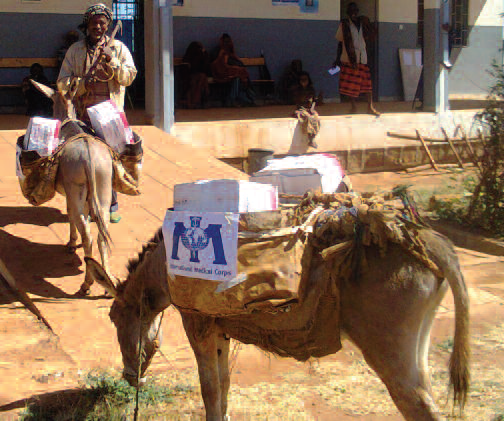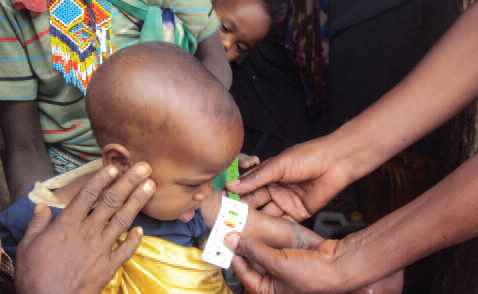Enlisting donkeys to improve nutrition support in rural Ethiopia
 Abduljebar Osman Abdulahi and Selamawit Yilma
Abduljebar Osman Abdulahi and Selamawit Yilma
Abduljebar Osman Abdulahi is the Project Nutrition Coordinator for International Medical Corps in Oromia region East Hararghe zone. For the past 11 years he has worked in the humanitarian field with both government and NGOs.
Selamawit Yilma is the Communication and Documentation Officer for International Medical Corps Ethiopia. She has worked for the past 14 years with INGOs, academia, media and a private organization.
East Hararghe Zone in Ethiopia is characterised by chronic food insecurity with regular droughts and internal displacement due to tribal conflicts resulting in high malnutrition rates. Children and pregnant and lactating women are the most vulnerable in this area to malnutrition and related health problems.
According to the most recent Emergency Nutrition Coordinating Unit (ENCU) classification, all the International Medical Corps’ (IMC) intervention woredas in East Hararghe zone are ‘priority one hotspot’ woredas. To address the underlying causes of ill health and malnutrition in these areas, IMC currently implements five active emergency nutrition, Water Sanitation and Hygiene (WASH) and Reproductive Health (RH) projects in seven drought and conflict prone woredas (Gursum, Midega-Tola, Gola-Oda, Chinaksen, Fedis, Meyu-Muluke and Kumbi).
 The situation in East Hararghe is aggravated by a lack of infrastructure and limited access to telecommunication. In some woredas the poor roads hinder the transport of medical, nutritional, and other supplies from the Health Centers (HCs) to the Health Posts (HPs). As a consequence, those needing treatment are unable to benefit from the Community Management of Acute Malnutrition (CMAM) programme1.
The situation in East Hararghe is aggravated by a lack of infrastructure and limited access to telecommunication. In some woredas the poor roads hinder the transport of medical, nutritional, and other supplies from the Health Centers (HCs) to the Health Posts (HPs). As a consequence, those needing treatment are unable to benefit from the Community Management of Acute Malnutrition (CMAM) programme1.
IMC Ethiopia has been supporting the Ministry of Health (MoH) logistically with transport of commodities and technically with classroom and on the job training as well as supportive supervision to implement CMAM (OTP, TSFP and SC components) since 2005.
The health officers in the above mentioned woredas repeatedly report that lack of access to supplies is a major barrier to the provision of CMAM services. Out of 174 HPs, 28 report challenges regarding the interruption of services mostly during the rainy season and are affected by either irregular or no supplies for the treatment of malnutrition. This reduces the coverage rate which is estimated to be 16.1%2.
To address this issue, the Zonal health department’s Nutrition Manager suggested using donkeys to transport OTP material and other health supplies from HCs to the HPs. In Gursum woreda, the use of donkeys to transport health supplies was piloted (despite resistance from some Zonal health department staffs who preferred to procure motor bikes instead). Based on the effectiveness of the approach, IMC decided to pilot the project in its target areas.
IMC provided donkeys and carts to twelve HCs across seven woredas in East Hararghe from June 2013 to January 2014. Donkey carts were bought at an average price of 2,200 Birr (115 USD), and used to transport vaccines, kerosene, RUTF, medication and water from identified HCs to HPs. The donkey carts are used three days a week to transport supplies; during the remaining days they transport items for the community to generate income that the HCs use to buy food and maintain the donkeys. One specific person in each HC is responsible for feeding, vaccinating and providing care for the donkeys with an average cost of 400 Birr (20 USD) per month. The woreda health office covers these costs.
In collaboration with zonal and woreda level government, IMC has been monitoring the donkey transport pilot project regularly to identify impact (if any) on the nutritional activities. Programme performance results from HPs in a woreda (Fedis) where donkeys were used for RUTF transportation was compared to performance data from HPs where there was no donkey initiative (Kombelcha woreda). Three HPs in each woreda were randomly selected and the number of stocks outs and numbers of defaulters during a period of four months (September to December 2013) were documented and compared. The below table indicates how many RUTF stock outs were reported from the HPs and the rate of default of children enrolled in OTP services.
|
Woreda |
HP | Sep | Oct | Nov | Dec | ||||
| Report zero RUTF | # of defaulters | Report zero RUTF | # of defaulters | Report zero RUTF | # of defaulters | Report zero RUTF | # of defaulters | ||
| Fedis (used donkey carts) |
Nega Bobas | 0 | 0 | 1 | 0 | ||||
| Kuf Bobas | 0 | 1 | 0 | 0 | |||||
| Bidibora | 1 | 0 | 0 | 0 | |||||
| 1 | 1 | 1 | |||||||
| Kombelcha (no donkey carts) |
Legehama | 0 | ? | 1 | ? | 2 | 2 | ||
| Wedesa | ? | 1 | 0 | ? | 1 | ? | 3 | ||
| Sercema | ? | 0 | ? | 0 | ? | 2 | ? | 2 | |
| 1 | 1 | 5 | 7 |
Monitoring data shows that HPs in Fedis woreda had far less out-of-stock reports of RUTF than HPs in Kombelcha. Furthermore, while only three people defaulted from the OTP services in Fedis HPs, 14 people defaulted in Kombelcha during the same period.
IMC will continue to monitor the impact of the project and will document in detail the challenges and lessons learnt as part of its end-term assessment and review. However the preliminary data presented above indicate that the donkeys in intervention areas are contributing to an improvement in access to medical and RUTF supplies and potentially to reducing the levels of default.
 As a result of the positive contribution of these donkeys, Fedis woreda HC has made a commitment to keep the donkey’s and continue to provide for them based on community contributions for their services. The Fedis woreda health office head acknowledged the contribution of the donkeys at the midterm review meeting held on May 19th, 2013.
As a result of the positive contribution of these donkeys, Fedis woreda HC has made a commitment to keep the donkey’s and continue to provide for them based on community contributions for their services. The Fedis woreda health office head acknowledged the contribution of the donkeys at the midterm review meeting held on May 19th, 2013.
“I was the one who opposed strongly the idea during the orientation workshop but am now advocating for the extension of this pilot project. Our OTP service can continue without interruption thanks to the donkeys”.
The Zonal health department has also been advocating for this practice to be extended to other woredas at the Zonal Emergency Nutrition Coordination Meeting (ENCU). The deputy head of Zonal health officer gave strong directions to other partners, NGOs and implementing partners to consider similar interventions in the future.
For more information, please contact Selamawit Yilma (syilma@internationalmedicalcorp.org) or Emebet Diasso (edlasso@internationalmedicalcorps.org).
1CMAM includes outpatient therapeutic care (OTP), stabilization centre services (SC), targeted and blanket supplementary feeding programmes (TSFP and BSFP).
2Programme data

